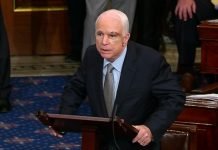Oh, how the mighty have fallen.
The richest, most powerful nation on earth, controlling seemingly inexhaustible resources (as well as the world’s largest military force and most advanced weaponry) cannot seem to keep its own house from crumbling into dust.
The Amtrak railroad accident on May 12th is highlighting this travesty, putting it on display for the world. Oh yes, now that the wreckage has been cleared and the line is back in operation, Amtrak has announced that it will be installing safety equipment designed to override locomotive controls and slow speeding trains as they travel into that section of track (the Amtrak train derailment itself was due to excessive speed, though it may be months before investigators are able to determine why the locomotive sped up).
The question remains: why was this equipment, which has been available for years, not installed earlier?
Of twenty-seven rail accidents reported around the world since the beginning of 2015, twelve of them – fully forty-four percent – took place in the United States. Five of those twelve rail accidents involved passenger trains. Number of casualties to date: 264, fourteen of which were fatalities.
Other industrialized nations that rely on high-speed trains have had rail safety technology in place for years. Case in point: the United Kingdom. After a series of fatal rail accidents in the late 20th and early 21st Century, automatic braking systems and advanced signaling were installed across Britain. Speaking to the U.K. Guardian, Roger Ford, technology editor for the journal Modern Railways, said, “When it comes to signaling, the Americans are very primitive.”
In fact, U.S. railroads rank dead last when it comes to global rail safety standards. It’s worth noting that of all the rail accidents reported this year, none took place in the U.K., France, Japan or China – all of which offer world-class high-speed rail service to their citizens. (There was a near-miss in England when a charter train failed to stop at a junction, barely avoiding a collision with an express train; the charter company has now been banned from using any U.K. rail lines.)
And the GOP-controlled Congress continues to cut funding for Amtrak.
There are still calls to fully privatize the beleaguered passenger carrier – as if that would solve the problem. In fact, if history is any indication, turning Amtrak into a private, for-profit corporation would only make things worse. Disasters such as the recent Amtrak train accident in Philadelphia would become even more frequent as these companies cut corners in order to maximize profits. The irony here is that Amtrak came about precisely because private railroads were losing money on passenger services. It is an issue that GOP lawmakers (as well as a fair number of Democrats) are incapable of grasping. There are some institutions and services that are simply not meant to make a profit – nor should they. Education, health care, water, energy and basic transportation services are examples of the commons that we as citizens all depend upon. Other nations have understood this since the end of the Second World War.
Of course, the objection constantly raised is taxation. Other industrialized nations have high tax rates on income as well as fuel and other products. This revenue is used in large part to fund the commons, such as safe, high-speed rail.
But here is yet another irony: while we in the U.S. pay lower taxes (and in the case of the hyper-wealthy and large corporations, barely any taxes at all), we are still paying the same costs for the services that people in other countries fund through their own taxes. And we’re getting a lot less for it. Just ask any of the more than 200 people who have been injured in rail accidents this year (and this year isn’t half over).
Until lawmakers finally figure out that the “free market” cannot and will not fix our crumbling infrastructure and finally stand up to those moneyed interests that are getting a free pass at the expense of the rest of us, expect more tragedies like the Philadelphia Amtrak train accident.



